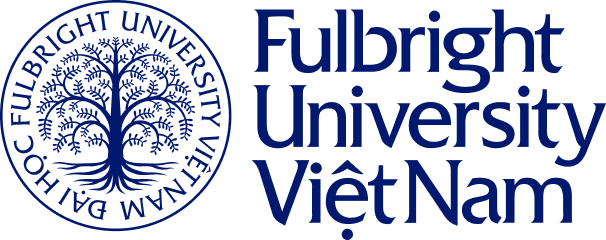
Recently, The Great Musica excellently surpassed more than 120 students from 25 universities across Vietnam to win the Accessibility Design Competition 2024. The team comprises 5 Fulbright students—An Lam Vu, Thuy-Duong Khanh Nguyen, Quynh-Trang Phan Do, Hanh-Nguyen Nguyen Tran, and Minh-Tuan Cao Nguyen. The group presented a project about a website that serves as a comprehensive music library for the blind and visually impaired. This platform will provide a diverse collection of Vietnamese music scores in Braille, along with a feature to convert standard music scores to Braille. The user-friendly website helps those with visual impairments easily access music, nurturing their passion and talents.
Fulbright reached out to An Vu, team lead of The Great Musica, and other members for a quick interview about this meaningful project.

An Vu Lam and the team were overjoyed when hearing The Great Musica was the winning team. Photogragh by The Great Musica
Hi Vu An and the team, how do you feel about this victory right now?
An Vu: Hello, on behalf of my team, I thank you for inviting us to this interview. We are very proud. After much effort, work, and sharing with teachers and mentors from Hue, Ho Chi Minh City, and Hanoi, our project received the competition’s recognition. This is truly a mesmerizing memory for us.
When did you come up with the idea to establish The Great Musica project?
In fact, the idea for this project originated from our own experiences while studying at Fulbright. The content in the class ‘Digital Humanities in the Vietnam Context’ inspired us to pursue this project. During a group discussion on how to apply technology to digitize the lives, culture, and people of Vietnam, one member of our group from the blind community asked, “How can we apply digital humanities to help our community?” After much discussion and research, we came up with the idea of creating a tool to convert standard music scores to Braille. We hope this tool can help the blind and visually impaired learn music more professionally and increase their opportunities for careers in music. The project has gone through two development phases, initially involving Duc Hoang Do, Ngoc-Quynh Thi Tran, and Hai-Yen Thi Dong, but due to personal reasons and academic workload, they could not continue but still supported the project.
What motivated your team to stick with the project up to now?
An Vu: Our greatest motivation is probably the desire to help disadvantaged communities gain equal access to job opportunities in life. With this project, we hope to bridge the integration gap between the blind community and the outside world. We also hope that music will be a tool and a language to help them communicate and connect with society. Although the blind and visually impaired community is large in Vietnam, there is still not much support, so we want to raise awareness from other communities to help them. These motivations have driven our team to continue developing the project to this day.

The Vietnamese Braille Music Library is a user-friendly website that helps visually impaired individuals access music easily.
How have the learning environment and campus life at Fulbright helped you learn and inspired you to develop the project?
An Vu: Fulbright has helped us a lot throughout the project’s development, from its inception to the current stage. In the beginning, many lectures at Fulbright and in Hanoi provided guidance to strengthen our project development plan. We had many hours-long meetings to address product development challenges for the blind and visually impaired community. Moreover, the dynamic learning environment at Fulbright enabled us to reach out to many supportive networks, such as the Sao Mai Center for the Blind. Through this connection, we learned and inherited the experience of developing technology projects for the community, creating spaces for connection, and promoting cooperation after product completion. Interestingly, the project also resulted from the collaboration with the Fulbright Digital Humanities Lab. Thanks to the lab support, our project management skills and connections to suitable financial sources are enhanced.
What are your plans after your recent achievement at Accessibility Design Competition 2024 to further develop the project?
An Vu: We are now focusing on building the website’s core functions, such as designing the user interface and UI/UX. Other essential features include converting Vietnamese music scores to Braille versions and uploading them to the website.
Alongside developing the website, we are building a Facebook community group, “Blind Music Lovers Community.” The discussion will center around musical opportunities and career prospects, creating a comfortable space for this community to interact and support each other.
Once we have a complete product, we plan to write a comprehensive research paper to submit to international conferences worldwide. We hope to share our perspectives and solutions for the special needs community.

Quynh-Trang Phan Do, a member of The Great Musica, presented their project at Accessibility Design Competition 2024. Photogragh by The Great Musica
Can the group list some achievements that the project has accomplished up to this point?
An Vu: Currently, we are very proud that the project has received positive recognition from everyone, such as:
- Champion of the GDSC IDEA CONTEST 2023: THiNK at the University of Technology in Ho Chi Minh City
- Presentation at the International Conference Engaging with Vietnam 2023 in Hue
- Top 5 in the Microsoft ASEAN AI for Accessibility Hackathon Vietnam 2024
- Champion of the Accessibility Design Competition 2024
Although our project is still young, we are significantly motivated to continue this initiative with the support from Fulbright teachers and friends, industry experts, and academia.
Thank you, An and the team, for sharing with Fulbright about the project. We wish The Great Musica many more advances in the future.

The Great Musica was also the champion of the GDSC IDEA CONTEST 2023: THiNK, organized by the Google Developer Student Club at Ho Chi Minh City University of Technology. Photogragh by The Great Musica








